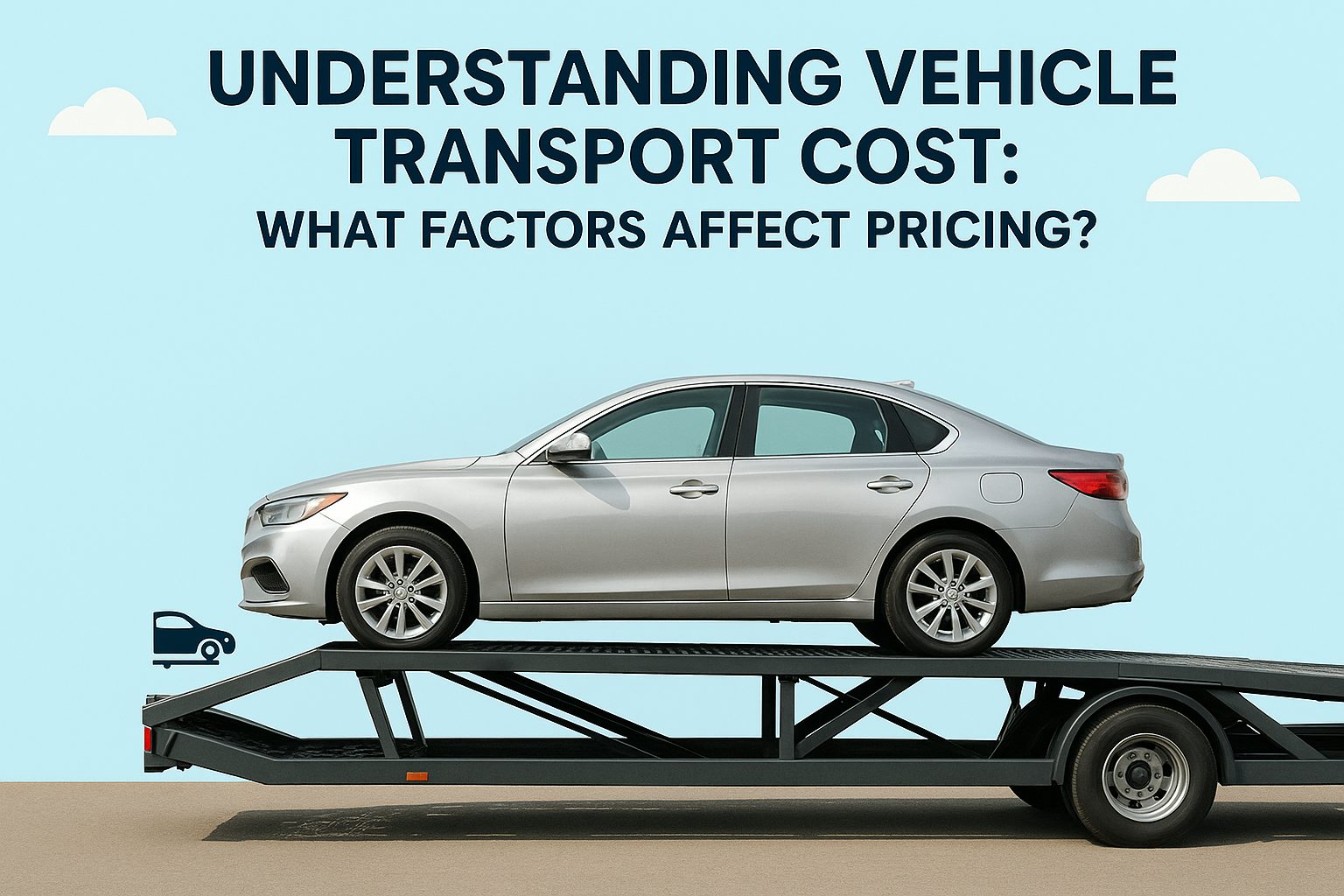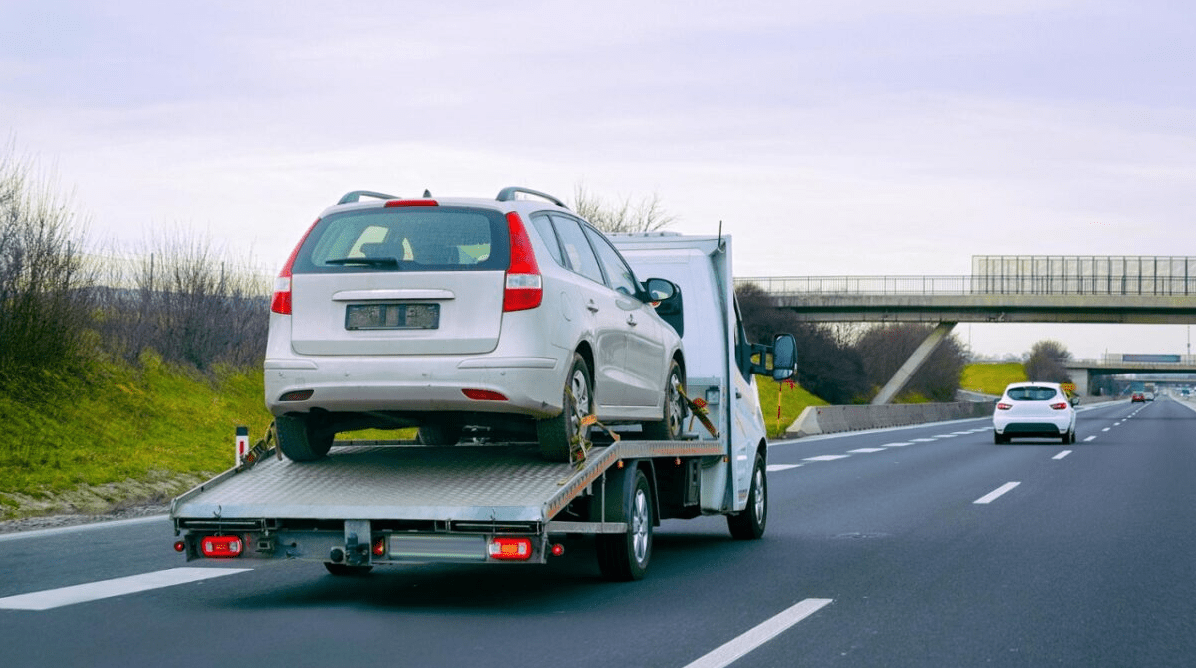So, you’re thinking about having your car shipped. Maybe you’re relocating, maybe it’s a collector’s piece you just scored at auction, or maybe you’re sending a car to your kid across the state. Whatever the reason, the first thing that usually comes to mind is How much is this going to cost to transport vehicle?
Honestly, it’s a fair question, and not always the easiest one to answer. The vehicle transport cost isn’t just pulled out of a hat. It’s based on a bunch of things, some obvious, others not so much. If you’ve never done this before, it can feel like you’re just guessing. But once you know what goes into it, the whole process makes a lot more sense.
Let’s walk through what actually affects how much you’ll end up paying.
1. Distance
Probably the most obvious factor. The longer the trip, the more it’s going to cost to transport a vehicle. That’s just the way it is. But here’s something most people don’t expect: short distances can sometimes feel surprisingly expensive per mile.
Let’s say you’re just moving your car 150 miles. Even though that’s not far, the driver still has to load it, drive out of their way, spend time on the road, unload it, and maybe not have another job lined up nearby. That’s a lot of effort for a relatively short trip, which means the per-mile rate goes up.
Long-distance moves, on the other hand, can seem more “worth it” per mile, but obviously, they still rack up a higher total overall. Either way, distance is usually the biggest slice of the pricing pie.
2. The Type of Car You’re Shipping
Not all vehicles are created equal when it comes to transport. A little compact car is easier to load, weighs less, and takes up less space. But a lifted truck? That’s another story. When it comes to shipping boats, especially those with larger dimensions or custom designs, boat shipping services often come with additional costs due to the specialized equipment needed.
Bigger or heavier vehicles might need more space on the trailer or a different kind of trailer altogether. Some low-clearance sports cars, for example, need special loading ramps or enclosed carriers to prevent scraping the undercarriage. That kind of special handling usually comes with an extra charge.
Also, the type of car sometimes changes the kind of insurance the transporter needs to carry during the trip, which can impact the vehicle transport cost, too.
3. Open vs. Enclosed Carrier
| Feature | Open Carrier | Enclosed Carrier |
| Enclosed Carrier | Exposed to weather, dust, and road debris | Fully covered, protected from elements and road hazards |
| Common Uses | Standard cars, daily drivers | Classic, or luxury vehicle transportation |
| Vehicle Transport Cost | More affordable | Typically more expensive |
| Visibility | The car is visible during transit | The car is hidden from view |
| Availability | More widely available and faster to schedule | Fewer carriers available, may take longer to book |
4. Timing
Here’s where things get interesting. Timing can seriously affect pricing, and not in ways people always expect.
If you’re flexible and don’t need your car picked up or dropped off on a specific date, you can usually get a better rate. The driver has more time to fit your job into their schedule.
On the flip side, if you need it moved right away or by a certain day, you’re going to pay extra. Urgency comes at a price because it means rearranging routes or bumping other jobs.
And let’s not forget seasons. Certain times of year, like summer and winter, tend to be busier. In the winter, lots of people are moving ctheir ars down south. In the summer, it’s moving season, and car haulers are in high demand. Rates go up with demand. That’s just how it works.
5. Where the Car Is Coming From
Pick-up and drop-off locations make a big difference. Suppose both addresses are in big cities or right off major highways, great. That usually makes the whole job smoother and cheaper.
But if the car’s in a rural area, or at the end of a windy mountain road, that’s going to cost more. Some spots are harder to get to. Some roads aren’t even safe for big trailers. In those cases, a driver might need to use a smaller truck just to get to you, or you might have to meet them somewhere more accessible.
If you’re also looking into shipping heavy equipment, remember that larger machinery will likely need a flatbed or specialized trailer, which is another example of how the type of vehicle directly affects transport costs.
The extra effort shows up in the final price.
6. Is the Vehicle Drivable?
If your car starts, moves, and brakes like normal, that’s a big plus. It means the hauler can load it on and off the trailer easily.
But if the car doesn’t run, if it can’t start, steer, or brake, it’s considered inoperable. That doesn’t mean it can’t be shipped. It just means they’ll need a winch, or in some cases, a forklift. That takes more time, more equipment, and possibly a second person. So, yeah, the vehicle transport cost will be more.
If your car needs special handling, it’s good to mention that up front so you’re not hit with surprise fees.
7. Door-to-Door vs. Terminal Shipping
Door-to-door service is exactly what it sounds like: your car is picked up and delivered as close as possible to the addresses you give. Super convenient. And yes, the vehicle transport cost will be a little more.
Terminal shipping is cheaper, but comes with tradeoffs. You’ll need to drop the car off at a facility and pick it up from another one at the destination. Sometimes these terminals charge daily storage fees if you don’t get your car right away. And in some cases, the car might sit there for days before it even hits the road.
So while you might save some money on paper, it can become a hassle fast.
8. Fuel Prices
This one’s pretty straightforward: when fuel prices are high, average vehicle transport costs go up. Trucks run on diesel, and those tanks are huge. A cross-country trip might cost a hauler hundreds, if not thousands, in fuel alone.
Unfortunately, fuel prices change all the time, and there’s no getting around it. It’s one of those built-in vehicle transportation costs that fluctuates depending on what’s going on in the world.
9. Insurance and Coverage
The best vehicle transport comes with basic insurance included, but that coverage varies. If you’re shipping something valuable, it’s worth asking about the details. What’s the deductible? What’s the coverage limit? Is cosmetic damage covered or just total loss?
If the built-in insurance doesn’t offer much peace of mind, you can usually add more. It’ll increase the total vehicle transport cost, but if something unexpected happens, you’ll be glad you spent a few extra bucks on it.
10. Extra Services or Special Requests
Sometimes, it’s the small stuff that adds up. Things like:
- Asking for a guaranteed delivery window
- Requesting your car be on the top rack (to avoid oil drips from above)
- Needing the car picked up from a tight driveway.
- Wanting to ship a second vehicle at the same time
Every request adds a little complexity. And in this business, complexity often means cost.
What’s a “Good” Price?
There’s no simple answer to that. Prices change all the time, and two people shipping similar cars over similar distances might still get different quotes depending on all the stuff we’ve talked about.
That said, if a price seems way too low compared to others you’re getting, it’s okay to be skeptical. Sometimes a lowball quote means corners might be cut, or it could mean hidden fees will show up later.
Better to go with someone who’s transparent about what’s included and doesn’t dodge questions.
Final Thoughts
If there’s one takeaway from all this, it’s that shipping a vehicle isn’t just about the miles. A lot of moving parts shape the vehicle transport cost: your schedule, the car’s condition, where it’s going, what kind of trailer it needs, and so on.
It might seem like a lot to think about at first, but once you understand what actually goes into the price, making the right decision gets a whole lot easier. Whether it’s your everyday ride or a prized collector’s car, knowing the true cost factors makes all the difference. For personalized service and expert care, reach out to Specialty Hauling SVCS, today.If you’re looking for personalized, reliable service from folks who truly care about your car, you can reach out directly at [email protected] or call 912-803-8356.
Frequently Asked Questions
What’s the biggest factor in transporting a vehicle cost?
Distance is usually the main cost driver, but vehicle type, timing, and transport method also play key roles.
Is enclosed transport worth the extra cost?
For classic, luxury, or low-clearance vehicles, enclosed transport offers better protection and peace of mind.
Do non-running cars cost more to ship?
Yes, inoperable vehicles require special equipment to load and unload, which adds to the vehicle transport cost.
Can I save money by being flexible with timing?
Absolutely. Flexible pickup and delivery dates often lead to lower rates and better scheduling options.
Why is rural pickup or drop-off more expensive?
Remote locations may be harder to reach or require extra travel, increasing fuel and labor costs.





